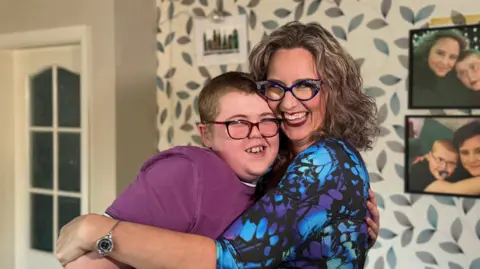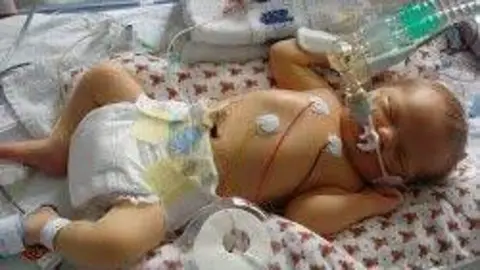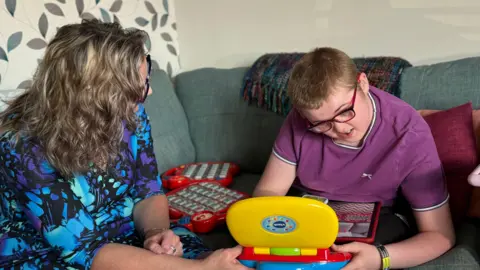Calls for maternity funding to remain ringfenced
 BBC
BBCThere are growing calls for millions of pounds of maternity care funding, announced after the Shropshire baby deaths scandal, to remain ringfenced.
Parents - including the Reverend Charlotte Cheshire, whose son was left severely disabled - have written to the health secretary about how individual health boards in England could now decide where to spend their money.
A maternity care review in 2022 found more than 200 babies and nine mothers treated by NHS Shropshire Telford and Wrekin could have survived with better care.
A Department of Health and Social Care (DHSC) accepted too many women were still not getting the care they deserved, but the government was "determined" to change that.
A spokesperson said the same level of funding was still being provided, but as part of broader allocations, to give more flexibility to local healthcare leaders.
The review following the scandal in Shropshire also found a further 94 children, like Rev Cheshire's son, Adam, suffered life changing injuries.
He was left severely disabled following an infection he developed after his birth at the Royal Shrewsbury Hospital.
An interim report in 2021 led to maternity care spending nationally being increased by £95m with the aim of improving safety - but it has since emerged this cash will no longer be ringfenced.
 Charlotte Cheshire
Charlotte Cheshire"For me that's both tragic and catastrophic," Rev Cheshire said.
The 47-year-old vicar from Newport, Shropshire, said the money had been specifically ringfenced because it was one of the worst maternity scandals in NHS history.
Despite Adam now being 14, he still plays with toys meant for toddlers and lives in residential care with 24-hour support.
He has a brain injury, is autistic, has hearing and sight impairments as well as profound learning difficulties.
On providing better maternity care, the DHSC spokesperson said: "This starts with listening to women and families to learn lessons, to improve care and ensure mistakes are not repeated."
They said they were training more midwives to support women throughout their pregnancy and after giving birth.

Care minister Stephen Kinnock said local Integrated Care Boards (ICB) were best placed to decide how best to manage care in their areas.
He said his department was not micro-managing ICBs, but they would be held accountable through targets being set.
Shropshire's ICB receives nearly £900,000 of the £95m allocated nationally.
Bosses at NHS Shropshire Telford and Wrekin said they were committed to making improvements to maternity services.
"As an Integrated Care Board, we have not made any changes to the level of service development funding allocated to our local maternity care in 2025/26," a spokesperson said.
Ten-year plan
Rev Cheshire told the BBC she remained worried, and her experiences meant she had lost trust in the services.
The Birth Trauma Association said it had concerns too.
Its chief executive Kim Thomas, said: "We know that Wes Streeting cares about maternity because he says it keeps him awake at night."
She said she was hoping details contained in a forthcoming 10-year plan, due to be published in June, may provide more certainty.
The DHSC spokesperson said progress had been made on a number of the recommendations from the All Party Parliamentary Group on Birth Trauma – including achieving a 5.8% increase in the number of midwives.
They announced this week a rollout of a national training programme to reduce the number of brain injuries incurred during childbirth, but acknowledged more needed to be done.
Follow BBC Shropshire on BBC Sounds, Facebook, X and Instagram.
